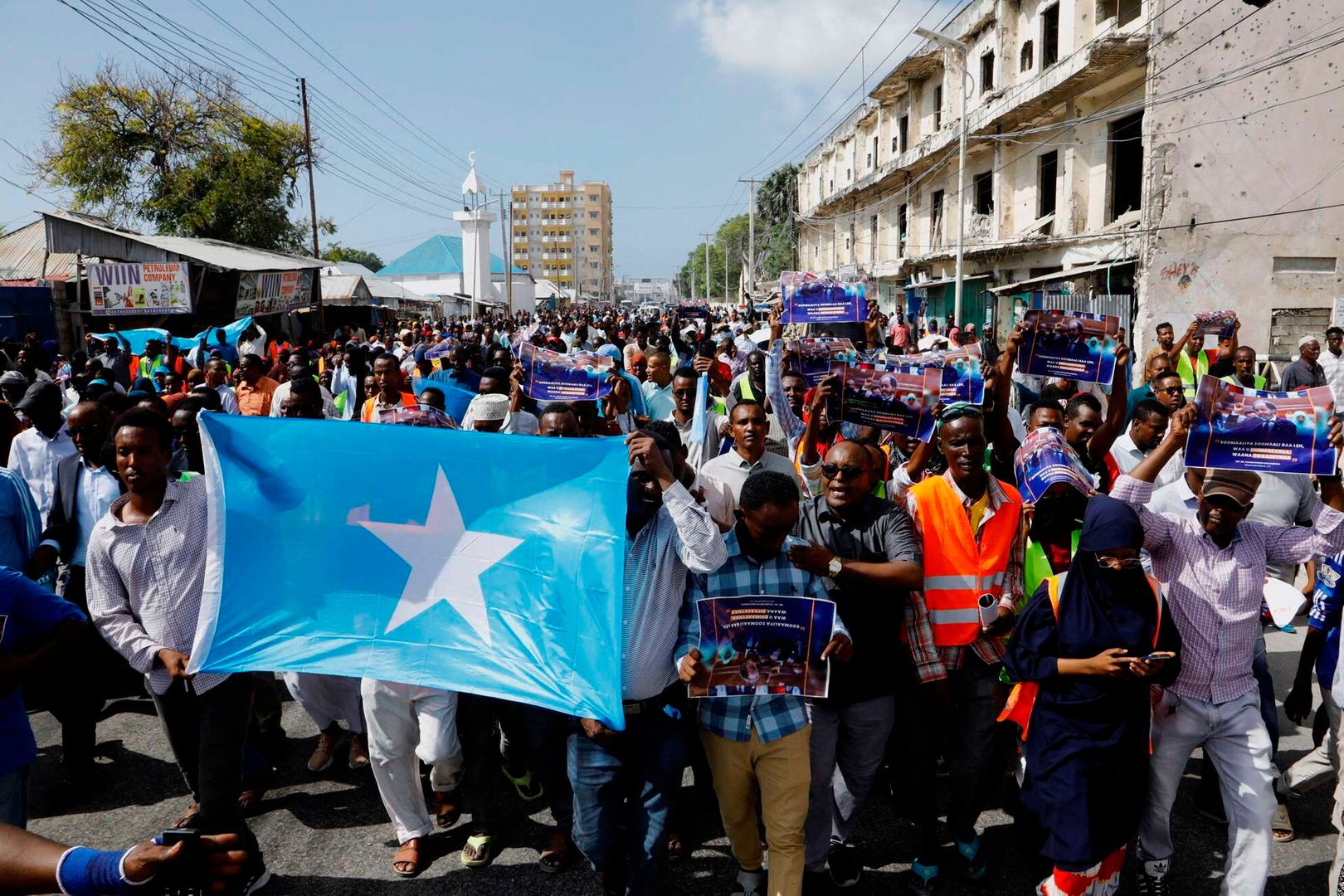
Somalia’s problem with paying for the next peace mission and the effects on Ethiopia
Since there are problems with neighboring Ethiopia and no one knows how much money they will have, Somalia is unsure what to do about the next part of peace support operations in the country.
This came up while President Hassan Sheikh Mohamud was traveling around the area to meet with the leaders of all the countries that sent troops to the African Union Transition Mission (Atmis) except for Ethiopia.
Mohamud went to Burundi, Djibouti, Uganda, and Kenya to talk about what the government news outlets called a “smooth transition” from Atmis to the new African Union Support and Stabilization Mission in Somalia (Aussom), which will begin in January 2025.
Aside from that, they said Aussom “must be adequately resourced and noted the importance of exploring all funding options, including Resolution 2719” as a reliable and long-term source of money.
After being passed in December 2023, Resolution 2719 allows peace support operations (PSOs) led by Africa to get up to 75% of their financial needs met by the UN. This solves a long-standing problem on the continent with how to pay for these missions.
But some important members of the UN Security Council have been slow to open the tap because they say the framework needs more time to be studied, especially in terms of how to use it on the continent.
“We are aware that some people have pushed for the new AU mission to follow the rules set out in UN Security Council Resolution 2719.” You shouldn’t use 2719 at this time or in this place. Robert Wood, the US’s alternative representative to the UN for special political affairs, said, “We need to work together closely to make sure that all the necessary mechanisms are in place so that a future 2719 mission has the best chance of succeeding.”
“Many of our partners agree with us that we shouldn’t use the framework too soon because that would hurt its credibility.” At a briefing for the UN Security Council in Somalia on October 3, he said, “Successful use will be key to keeping international trust in and support for this tool in the long term.”
The East African knows that the US and other partners want the 2719 to go into effect in 2026. A source said that this would give experts from the African Union and the UN a chance to talk about the details, such as how to group missions that are eligible for funds.
In the meantime, the official says that Atmis could be extended by another two months, relying on the only money that is available from the EU.
In the beginning of the year, the AU and the UN decided on a plan for putting the Resolution into action. According to the timelines seen by The EastAfrican, full implementation won’t be possible until after August 2025. However, experts should have figured out how much money would be needed to carry out the resolution and its specific goals by the end of the year.
The Resolution says that the African Union can ask for money, but the UN makes decisions about each request individually. The AU has said that UN help for local missions is important because it knows what parts to include.
A well-funded peace and security infrastructure is not just an African priority; it is a public good for everyone, according to the Joint AU-UN Roadmap. “It is very important to look at peace operations in Africa as a whole.” While UN Peace Keeping Operations are still important for promoting and keeping peace and safety, there are strong philosophical, political, and practical reasons to support AU PSOs.
But AU peace support operations rest on how well the host country gets along with the countries that send troops. The countries that send troops will now be called troop partner states (TPS) under the Aussom idea of operations.
Somalia told Ethiopia this week that it no longer trusted them to help keep the peace in Mogadishu.
Ethiopia’s Ministry of Foreign Affairs said in a statement on Wednesday that it will decide which countries will send troops to Aussom starting in January 2025.
The statement said, “Ethiopia’s recent unilateral actions, such as an illegal agreement with Somalia’s northern region, violate our sovereignty and weaken the trust that is needed to keep the peace.”
“Previous deployments by Ethiopia have only led to more al-Shabaab activity and not much progress.” This means that Aussom needs to choose its troop partners with more care to make sure it fits with Somalia’s security and economic goals.
Mogadishu wasn’t sure on Wednesday if Ethiopia would send any troops or not. However, Somalia’s Foreign Minister Ahmed Moalim Fiqi said last month that Addis Ababa would not be a part of the new group, saying that it would violate Somalia’s national integrity.
In January, Ethiopia signed a memorandum with Somaliland, a region of Somalia that broke away and declared independence in 1991 but is not yet acknowledged as such by the rest of the world. This led to the fight.
The MoU has never been made public, but officials said it would let Ethiopia build a military base on the sea in Somaliland in exchange for Somaliland’s independence being recognized.
Mogadishu says that Ethiopia’s move to give land to Somaliland so that it can build a diplomatic mission in Addis Ababa and to send weapons to the Puntland region have made things worse.
“The choice about sending troops must be in line with Somalia’s national interests and the protection of its sovereignty,” the country said. “We are still committed to working on Aussom with the African Union, the UN, and the European Union. Somalia will lead the way in choosing partners who will respect our sovereignty.” Somalia will not give in when making choices that will affect its safety and future.
Members of the National Assembly Defense, Intelligence, and Foreign Relations Committee in Kenya, Yusuf Hassan, said that the disagreement between the two countries should be simple to settle. He is a lawmaker for the Kamukunji Constituency.
“The conflict between Somalia and Ethiopia is made up and can be avoided.” Ethiopia needs to recognize that Somalia is an independent country. “If they have to deal with Somalia at all, they have to do so with a recognized government in Mogadishu,” Mr. Hassan said at HornTalk, a weekly event on the politics of the Horn of Africa put on by the Nairobi-based Africa Policy Institute.
“There will be no winners in a fight that has to happen.” It will end in destruction for everyone. We need to determine a way to fix these problems connected to getting to the sea. The situation is likely to get worse if nothing is done. This will hurt not only Ethiopia and Somalia but also the whole area.
Experts agree that if things don’t calm down, cooperation against the shared enemy, al-Shabaab, will break down, which will help the militants do well.
There was a need to uphold “the constitutive principles of respect for territorial integrity, sovereignty and non-interference” in Nairobi, Mohamud’s last stop on the shuttle diplomacy. He said this in a joint statement with his host President William Ruto.
At the moment, Ethiopia is contributing to Atmis. However, the two countries have also agreed that Ethiopia will send more troops to Somalia. Now, Mogadishu says they should leave before the end of the year, but Ethiopia says that would be bad for the safety of the Horn of Africa.
“Ethiopia can squat in some places in Somalia, and that will have effects.” However, Somalis don’t like how Ethiopia carried out its January 1, 2024, MoU with the Somaliland region. Because of this, Dr. Adam Aw Hirsi, director of the Mogadishu-based think tank Foresight for Practical Solutions, said, “It is hard to see Ethiopia operating legally in Somalia with the permission of the Somali government.”
“No one in Villa Somalia can approve the presence of ENDF (Ethiopian forces) in Somalia as long as Ethiopia says it wants to have a naval base in an area that Mogadishu and the rest of the world consider to be part of Somalia,” Dr. Hirsi said.
Kenya tried to bring Somalia and Ethiopia’s leaders together to talk about the memo of understanding with Somaliland, but they wouldn’t.
Two times, Turkey has tried to be a mediator but failed. Ankara said it would meet with each side separately first before making plans for another meeting.
Mogadishu has said that any talks can only happen if Addis Ababa publicly backs out of the MoU. Some experts say that Ethiopia should think again about the deal or do the MoU all over again through Mogadishu.
On the HornTalk, Dr. Kenneth Ombongi, Associate Dean of Research at the University of Nairobi, said, “Fights over expanding land should be left to history.” “We need to strongly ask the rest of the world to step up their presence and pressure to help lower the tension.”
Recently, Ethiopia has changed what it says in public, saying that it wants to solve the problem of access to the sea through political means.
All Categories
Recent Posts
Tags
+13162306000
zoneyetu@yahoo.com


